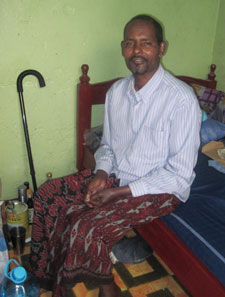Veteran Somali radio journalist Hassan Mohamed, 45, died early yesterday morning in Eastleigh, a Nairobi suburb. He had fled Mogadishu in 2010, having been threatened, kidnapped, and shot twice. One of hundreds of Somali refugees in Kenya, many of them journalists, Hassan struggled to support himself and survive worsening diabetes-related ailments, despite relentless support from Somali colleagues and friends, including CPJ. His death highlights the plight of exiled journalists in East Africa.
Affectionately known as “Jaeyl,” Hassan was a reporter, producer, and librarian at Somalia’s first independent broadcaster, founded in 1999 — HornAfrik, a radio station that he kept on the air even after senior staffers fled the country. To the Mogadishu public, he was most famous for his radio dramas — morality plays about local society.
Hassan’s comical yet poignant dramas were perhaps one of the reasons why the Islamic militants, Al-Shabaab, targeted him. HornAfrik, then one of main private broadcasters in Somalia was, like other stations, blacklisted by Al-Shabaab as a “pro-government” outlet.
In December 2009, Hassan was shot in the hand and back as he left the radio station, moments after refusing to air a message from religious figures with alleged ties to Al-Shabaab. In 2010, he spent over four months recovering from a gunshot wound to the leg, after he was caught while on assignment in street crossfire. Later that year, Al-Shabaab insurgents raided the HornAfrik offices, tied and blindfolded Hassan and other staffers, and burned the station’s archives. Again, Hassan survived, but HornAfrik was forced off the air. As rumors spread following the attack that HornAfrik was planning a comeback, Hassan began receiving repeated and distressing telephone death threats. At that point, fearing for his life, he fled to Nairobi.
The trip was grueling, and Hassan lost everything (including his papers and little savings) off a moving truck along the way. Once in Kenya, penniless and paperless, Hassan was unable to receive any kind of official assistance — even for his diabetes, which quickly deteriorated.
One of the few things that kept him going during this arduous time, he told CPJ, were phone calls from children back in Mogadishu, who wanted him to retell his radio dramas. Although the calls boosted his spirits, Hassan’s health worsened with lack of medical attention, improper diet, and stress.
In 2011, Hassan was hospitalized several times with different kinds of diabetes complications, and he eventually lost a leg. In 2012, he spent several weeks in a coma, though he regained consciousness before passing away. He is survived by a wife and six children, some of whom are based in Nairobi.
Throughout his ordeal, Nairobi-based exiled Somali journalists banned together to support Hassan financially (through a fundraiser) and emotionally (with continuous visits and support.) They also worked obstinately to advocate on Hassan’s behalf with international organizations, including CPJ, to ensure that assistance for Hassan was sustainable. CPJ’s Journalist Assistance Program and its partners the Doha Centre, Reporters without Borders, Journalists Helping Journalists and the Rory Peck Trust supported Hassan financially during that time.
But even joint efforts for financial assistance were not enough. From Nairobi, CPJ reached out to exile organizations. From New York, Paris, and London, international groups worked with the United Nations High Commissioner for Refugees to try to get the journalist officially registered as a refugee. In the meantime, a group of Somali journalists, led by Mohamed Garane, physically cared for Hassan, while continuing to reach out to other groups. Even then, we were hampered by the massive needs of the exiled community in Nairobi and Hassan’s extreme medical situation.
By CPJ’s count, in the past decade, 33 percent of journalists forced into exile worldwide came from East Africa. In the last year alone, more than 16 journalists have fled Somalia. The vast majority live in very difficult conditions in Eastleigh — unable to work and meet basic needs, such as medical care; far from their families; in a legal and professional limbo; and constantly harassed by local authorities or suspected Al-Shabaab insurgents.
Hassan’s case was one of several catalysts for convening a conference in December 2011, when CPJ and several international, regional, and local groups met in Nairobi with more than a dozen exiled journalists to discuss new solutions for support. The groups who participated are now actively working to implement a sustainable and shared action plan for more systematic assistance for journalists such as Hassan.
